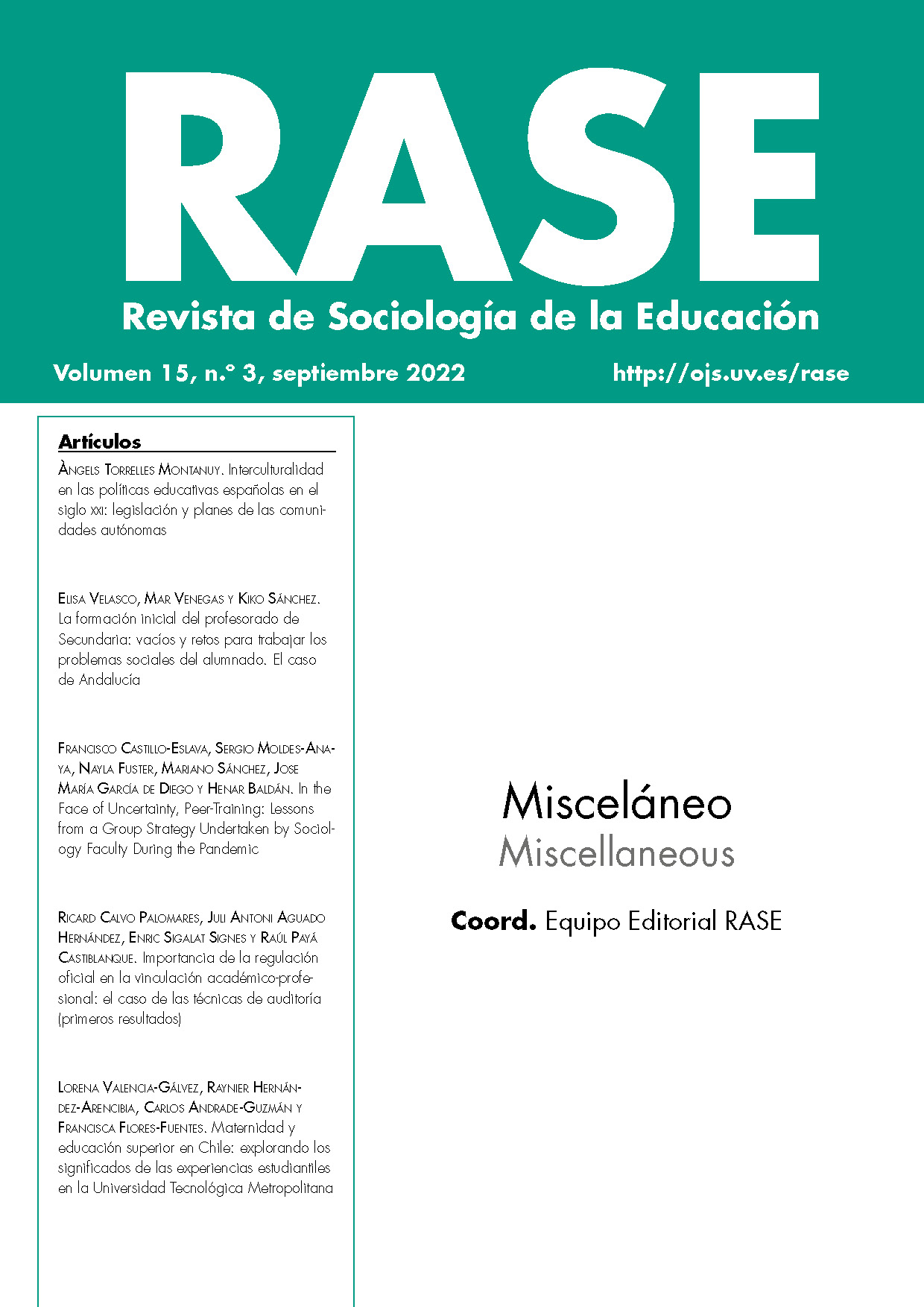Importance of Formal Regulation in Academic-Professional Linkage: The Case of Auditing Techniques (First Results)
DOI:
https://doi.org/10.7203/RASE.15.3.24909Keywords:
Labor Sciences, socio-labor audit, profession, academic-professional linkage. Abstract
Abstract
One of the underlying objectives of current university teaching is to try to connect it with the professional reality that graduates will later find in the labor market. In highly applied subjects, the existence of an official normative regulation becomes a key element for the success of any teaching proposal. In this context, the present research tries to study the effect of official regulations on an educational innovation proposal in Labor Sciences. To this end, a quantitative methodology is used through a survey by means of a standardized questionnaire to the students of the subject of Audit Techniques of 3rd year of the Degree in Labor Relations and Human Resources of the Faculty of Social Sciences of the University of Valencia, from the courses 2017-2018 to 2020-2021 (n=311) that evaluates different aspects related to their degree of satisfaction with the methodology, practices, contents and support materials, as well as with the perception about the projection of the subject in the professional sphere. The results obtained show the importance of the official regulation in the evaluation of the difficulties faced by the socio-labor audit, as well as the existence of an association between the variables of perception of the usefulness of the subject and as a good professional outlet with respect to the courses before or after the new regulation, so that the modification of the evaluations can be attributed to a large extent to this circumstance.
 Downloads
Downloads
 References
References
Abraham, S.E., y Karns, L.A. (2009): “Do business schools value the competencies that businesses value?”. Journal of Education for Business, 84(6), 350-356.https://doi.org/10.3200/JOEB.84.6.350-356
Barbosa, I., y Freire, C. (2019): “Portuguese employer's perceptions on management undergraduates' transferable competencies”. Journal of Management Development, 38(2), 141-156. https://doi.org/10.1108/JMD-07-2017-0244
Bellucci, A., y Pennacchio, L. (2016): “University knowledge and firm innovation: evidence from European countries”. The Journal of Technology Transfer, 41(4), 730-752. Doi: 10.1007/s10961-015-9408-9
Campamá, G. (2006): “Gestión de los recursos humanos. La auditoría sociolaboral”. Forum de Calidad, 176, 46-49.
Ciruela, A. (2009): “La formación del capital humano como elemento de desarrollo de las cooperativas. Análisis de las necesidades formativas en las sociedades cooperativas mediante procesos de auditoría sociolaboral”. CIRIEC-España. Revista de Economía Pública, Social y Cooperativa, 64, 85-104.
Dasgupta, P. y David, P. (1994): “Towards a new economics of science”. Research Policy, 23(5), 487-522.https://doi.org/10.1016/0048-7333(94)01002-1
De la Poza, J.M. (1983): Principios de Auditoría Sociolaboral. Bilbao: Ediciones Deusto
Fuentes, F., Morales, A. y Veroz, R. (2005): Introducción a la auditoría sociolaboral. Murcia, España: Diego Marín, Librero-Editor.
Del Bas, E. Calvo, R. y García, M.A. (2015): Auditoría Sociolaboral. Teoría y práctica de una herramienta para la gestión de los RRHH. Valencia: Tirant lo Blach.
Graus, M. E. G., y Springer, R. Y. B. (2020): Recursos estadísticos para investigar sobre coherencia didáctica. Dilemas Contemporáneos: Educación, Política y Valores.
Gómez-Gallego, J.C., Gómez-Gallego, M., Pérez-Cárceles, M.C., Palazón-Pérez de los Cobos, A. y Gómez-García, J. (2013): “Interacción entre las expectativas académicas del alumno y la evaluación del profesorado”. Aula Abierta, 41(2), 35-44.
Hall, B. (2003): “On copyright and patent protection for software and databases: a tale of Two-worlds” en O. Granstrand (Ed.): Economics, Law and Intellectual Property (pp. 259-277). https://doi.org/10.1007/978-1-4757-3750-9_12
Hurtado, M. J. R., y Silvente, V. B. (2012): “Cómo aplicar las pruebas paramétricas bivariadas t de Student y ANOVA en SPSS. Caso práctico”. Reire, 5(2), 83-100.
Jiménez-González, A., Terriquez-Carrillo, B., y Zepeda, F. J. R. (2011): “Evaluación de la satisfacción académica de los estudiantes de la Universidad Autónoma de Nayarit”. Revista Fuente, 2(6), 46-56.
Lacave, C., Molina, A. I., Fernández, M., y Redondo, M. Á. (2016): “Análisis de la fiabilidad y validez de un cuestionario docente”. ReVisión, 9(1).
Laursen, K., y Salter, A. (2004): “Searching high and low: what types of firms use universities as a source of innovation?”. Research Policy, 33(8), 1201–1215. Doi: https:// doi.org/10.1016/j.respol.2004.07.004
Lukas, J.F., Santiago, K., Etxeberria, J., y Lizasoain, L. (2014): “Adaptación al Espacio Europeo de Educación Superior de un cuestionario de opinión del alumnado sobre la docencia de su profesorado”. RELIEVE. Revista ELectrónica de Investigación y EValuación Educativa, (20)1, 1-20. https://doi.org/10.7203/relieve.20.1.3812
Mansfield, E. (1995): “Academic research underlying industrial innovations - sources, characteristics and financing”. The Review of Economics and Statistics, 77(1), 55–62. Doi: https://www.jstor.org/stable/2109992
Martensen, A. y Grønholdt, L. (2009): “Quality in higher education: linking graduates' competencies and employers' needs”. International Journal of Quality and Service Sciences, 1(1), 67-77.https://doi.org/10.1108/17566690910945877
Mejías, A., y Martínez, D. (2009): “Desarrollo de un instrumento para medir la Satisfacción Estudiantil en Educación Superior”. Docencia Universitaria, 10(2), 29-47.
Mora, A. (2020): Conocer para transformar. Métodos y técnicas de investigación en trabajo social. Valencia: Tirant lo Blanch.
Mulder, M., Gulikers, J., Biemans, H., y Wesselink, R. (2009): “The new competence concept in higher education: error or enrichment?”. Journal of European Industrial Training, 33(8‐9), 755-770. https://doi.org/10.1108/03090590910993616
Peña, J. V. (2003): Desarrollo profesional del docente universitario. Monografías virtuales, 3. (en línia) https://www.oei.es/historico/valores2/monografias/ monografia03/reflexion03.htm, consultado el 23 de abril de 2022.
Petruzzelli, A., M. (2011): “The impact of technological relatedness, prior ties, and geographical distance on university-industry collaborations: a joint-patent analysis”. Technovation, 31(7), 309-319. Doi: https://doi.org/10.1016/j.technovation.2011.01.008
Torras, E., y Ribas, J. (Coord.) (2005): Auditoria sociolaboral I. Barcelona, España: UOC.
Vázquez, A. y García, M. (2003): Tratado de Auditoría laboral. Barcelona: Difusión Jurídica y Barcelona. Temas de actualidad S.A.
Downloads
Published
How to Cite
-
Abstract528
-
PDF (Español)242
Issue
Section
License
![]()
This work is licensed under a Creative Commons Reconocimiento-NoComercial-CompartirIgual 4.0 Internacional.




